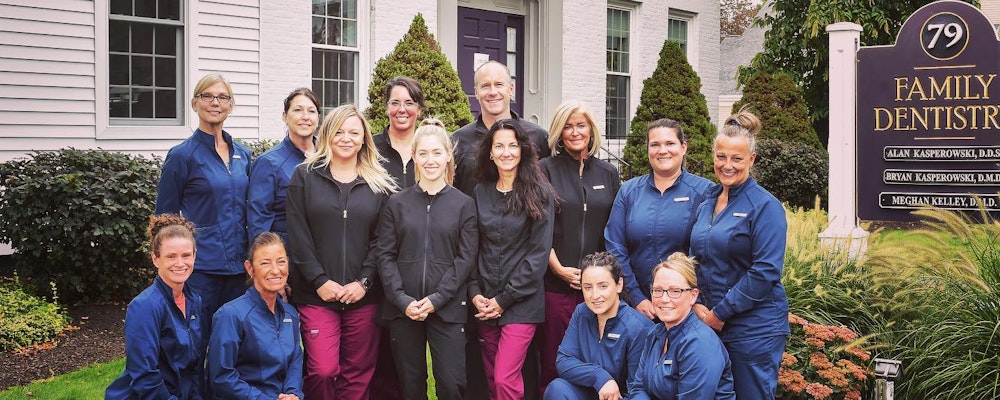
Root Canal Infections
Are You in Acute Pain?
A root canal is a dental emergency. If your root canal infection has advanced to the point where you are in acute pain, we will arrange care as soon as possible. Don't tough it out. Request an appointment now.
"Hands down the best dentist."
I'm a new patient here, had my first cleaning yesterday. After leaving my childhood dentist for a slew of horrible things I won't get into, I was very nervous to go to a new dentist. They made me feel right at home as soon as I walked in the door...
View On GoogleHands down the best and only dentist I will ever go to. Everyone there is nice and very careful I’ve never had a bad experience there and I absolutely hate the dentist. They are the best and I can’t thank them enough.
View On GoogleDo I Need a Root Canal?
While acute pain is the signal no one misses with a root canal infection, there are other, more subtle signs that a root canal is needed.
Severe Toothache
Swollen Gums or Cheeks
Bad Taste in Your Mouth
Sensitivity to Hot or Cold
Pain When Biting or Chewing
Chronic Bad Breath
Tooth Discoloration
The Pain Stopped
Do I Still Need a Root Canal?
In a word: Yes. When an infected tooth stops hurting, it doesn't mean that the infection cleared up on its own. It just means that the nerve inside your tooth has died. The infection is still present in the soft tissue and blood vessels inside your tooth. From there, the infection can spread to the gums, other teeth, and jaw. Left unchecked, the infection can even spread to your bloodstream, which is a medical emergency.
If you've experienced symptoms of an infected tooth, the dentists at Kasperowski Family Dentistry in Westfield, MA, will take dental X-rays and examine your mouth to confirm that you need a root canal before recommending treatment.
The Advantage of Studying Endodontics You Don't Have to Wait for Treatment From an Endodontist
Endodontics is the field of dentistry that concerns dental pulp, tooth roots, and the tooth chamber. Root canal treatment is considered endodontic treatment and can be completed by a general dentist or endodontist.
If you need root canal therapy to alleviate your pain, save your tooth, and treat any abscesses, you don't have to familiarize yourself with an endodontist. Our dentists, Bryan Kasperowski and Meghan Kelley, can help you. They have both undergone extensive training in the field of endodontics and can provide you with the same advanced techniques you would receive from an endodontist. With their gentle application, root canal treatment is about as painful as getting a temporary filling.
If you need an endodontics procedure, contact Kasperowski Family Dentistry today.
Patients Enjoy Our Westfield Dental Office
Meghan Kelley is the best dentist I have ever had! Very professional, personable, and cares about your comfort and concerns. Takes the time to explain everything and answer all questions asked thoroughly. Highly recommend!!
View on GoogleGreat dental care. Dr Al and Dr Brian provide friendly, professional quality care. The office staff is friendly and helpful. The hygienists take time to make sure all is good with every checkup. If you have emergencies or questions, as a regular patient they get you right in and take care of any questions, concerns or problems that need attention. If you need a great dentist, call Kasperowski up!
View on GoogleAre There Any Alternatives to Root Canal Treatment?
The only alternative to root canal treatment is extraction, which is sometimes required if the infection is severe and the tooth can't be saved. If your tooth must be extracted, you will require a dental implant to prevent shifting teeth and diminishing jawbone tissue, oral health problems that occur after losing a tooth.
If you do need a tooth extraction, Dr. Alan Kasperowski can place a dental implant, provided that you have enough jawbone density. While nothing compares to your natural tooth, a dental implant is the strongest option for patients with missing teeth.
Though our Westfield dentists can replace a missing tooth with a dental implant and restoration, we recommend not allowing your infection to progress that far. You can save yourself time and money by treating your root canal infection promptly.

Gentle Root Canal Treatment Steps Procedure Timeline
Our dentists are trained in endodontic treatments and have extensive training in oral surgery, pain management, and implant surgery
Aftercare
Rest
For the first few days after your procedure, you should give the treatment site time to heal. You will likely experience some swelling and discomfort. Over-the-counter medication and a cold compress can help you manage your symptoms.
Eat Soft Foods
Hard foods can irritate the treatment site, so we recommend eating soft foods like applesauce and mashed potatoes that require little to no chewing. Over the next few days, sensitivity in the mouth should fade and you can return to your normal diet.
Be Gentle
You should continue to maintain good oral hygiene but be gentle. Continue brushing twice a day and flossing once a day to maintain your oral health and minimize your risk of needing another root canal treatment in the future.
If you experience prolonged pain, swelling, or bleeding, contact our Westfield dental office so we can examine your treatment site.
What Causes Root Canal Infections?
Untreated Cavity
Untreated cavities just get bigger and bigger and will eventually reach the pulp inside the tooth.
Loose Fillings
A loose filling can lead to new decay and an opportunity for bacteria to infect a tooth's root canal.
Cracks
A crack can be an open door for bacteria to find its way to a tooth's pulp, necessitating a root canal.
Trauma
Dental trauma can damage both the hard exterior of a tooth and the pulp inside.
The Importance of Regular Dental Visits
Root canals often start as simple cavities. But the cavities keep growing and growing until they pierce the hard outer shell of your tooth and reach the tissue inside. Regular dental visits can help you avoid this by catching cavities when they're still small.
"The most friendly, competent, and dedicated staff."
I travel an hour for the most friendly, competent, and dedicated staff. Not many places around where the staff genuinely know each patient. Dr's. Alan and Brian always impress me. All I can say is thank you.
View On GoogleI have been avoiding the dentist for years because of fear from past experiences. The entire staff at Kasperowski Dental has made me feel so comfortable from the moment you walk into the office until you leave. They listen to you and make the entire experience a pleasant one. Dr. Bryan is the BEST!
View On Google






